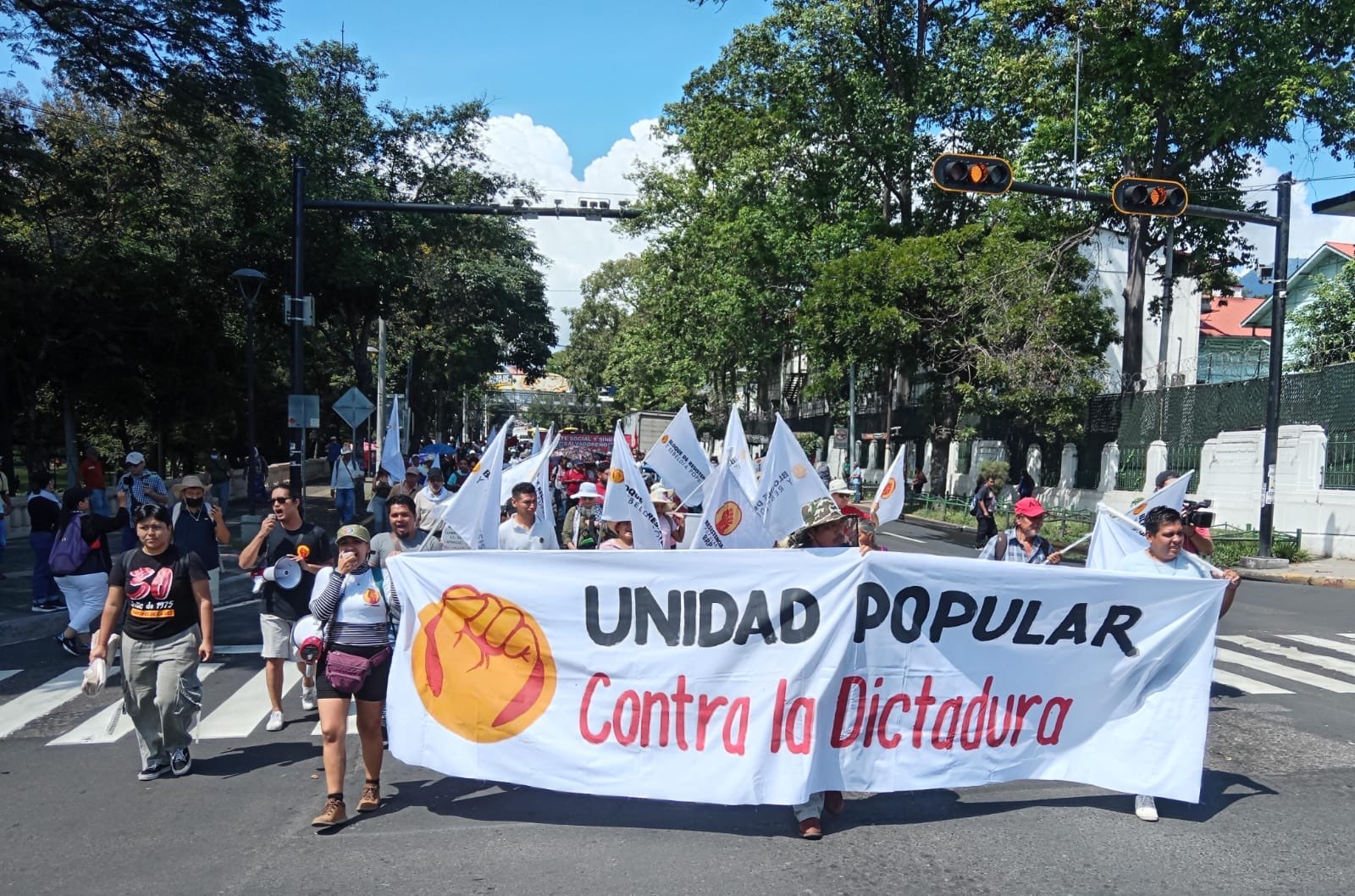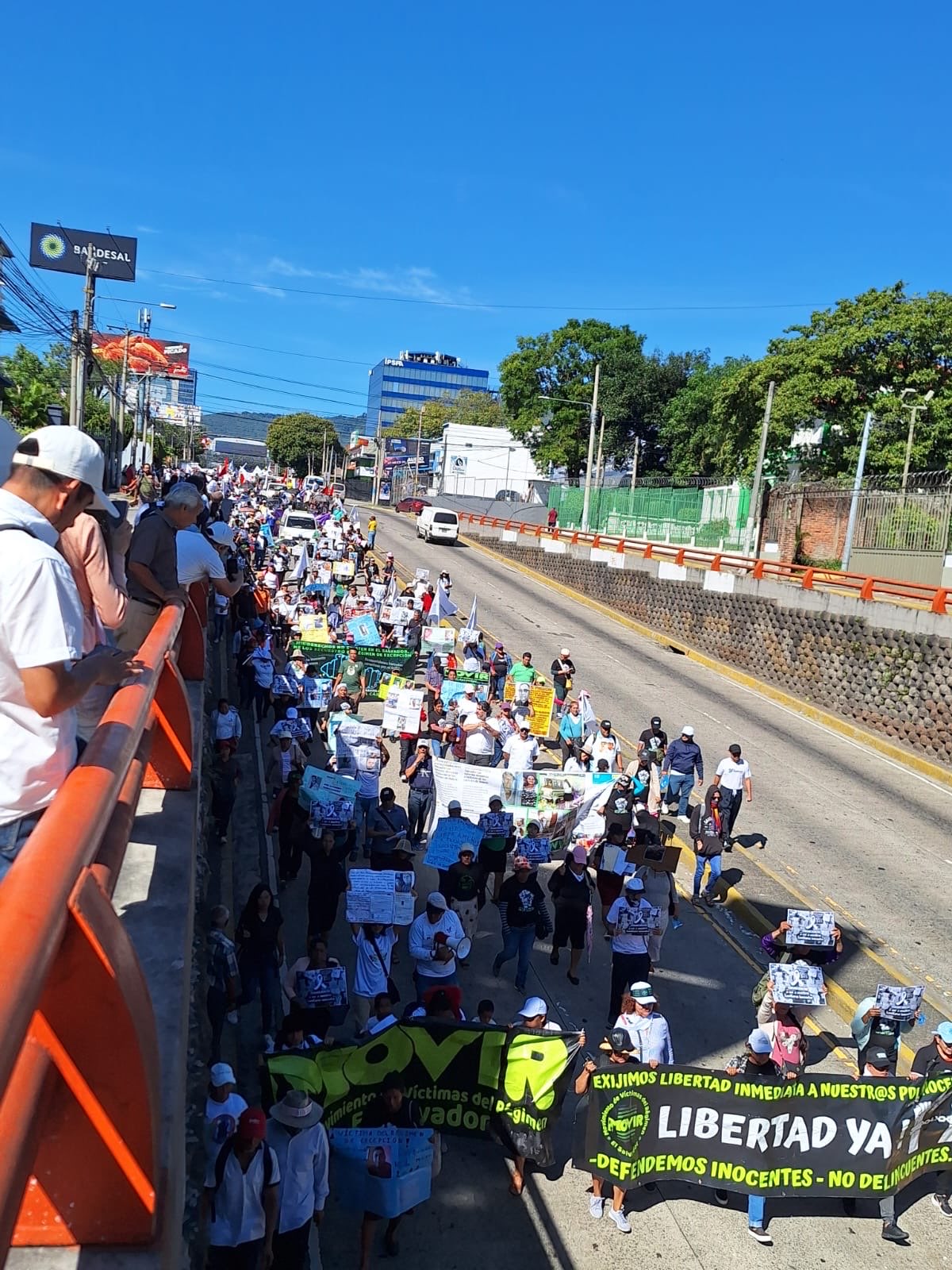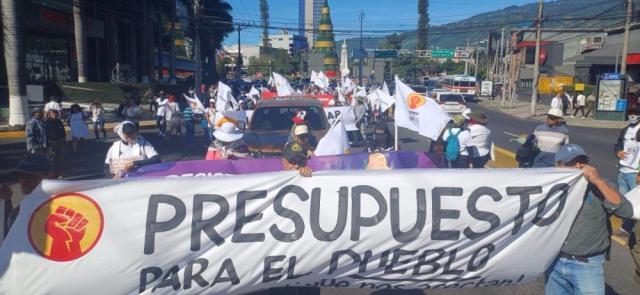El Salvador’s Popular Social Movement Mobilizes to Reject Bukele’s Budget Proposal
Diverse sectors of Salvadoran society once again took to the streets on November 23 to denounce the Bukele regime’s attacks on public sector workers and the deep cuts to social spending included in the proposal for next year’s budget. Saturday’s march followed a series of activities led by the emerging Movement for the Defense of Working Class Rights (MDCT), the convener of an October 19 march that mobilized thousands of education and healthcare union members, and activities by the Popular Rebellion and Resistance Bloc (BRP), which presented an alternative people’s budget to the Legislative Assembly on October 31.
In the days following the October 19 “Marcha Blanca,” whose name referenced protests led by medical workers against attempts to privatize parts of the healthcare system under the right-wing ARENA governments of the late-1990s and early 2000s, several prominent participants were fired in retaliation. Over one hundred healthcare and education workers were laid off in the following weeks.
Organizers of the November 23 march warned that the government is utilizing the idea of retaliation as a smokescreen to begin implementing this latest wave of massive layoffs. Francisco Omar Parada of the BRP called on workers to continue to take to the streets in protest as the only hope for protecting public workers and services.
“The firings aren’t retaliation. That’s what the government wants us to think, but we know that the budget bill that has been presented to the Legislative Assembly includes a wave of firings and we can see that it has already begun. They’ve started by firing people they can use as examples, but it was done that way so that people don’t mobilize. However, we believe that it is important for people to mobilize…and denounce these labor and human rights violations.”
The ad hoc coalition of unions and civil society organizations that convened the October 19 march, the MDCT, were joined at Saturday’s protest by the BRP, who had encouraged all Salvadorans to join the march. “[The government’s budget] would further deteriorate living conditions for the population that are already in a deteriorated state. This would exacerbate the already serious impoverishment that the Salvadoran population has suffered in the last five years…The organizations of the BRP invite the Salvadoran population to mobilize, to speak out, and to demand better living conditions for the whole population and a budget that responds to the needs of the people.”
The BRP, following its wholesale rejection of the government’s 2025 budget bill, created its own “people’s budget” through a process of consultation with the diverse sectors that make up the coalition, as an alternative to the drastic cuts in social spending included in Nayib Bukele’s bill. Marking Salvadoran Unionist Day, which commemorates the 1989 bombing of the National Federation of Salvadoran Workers' Unions (FENASTRAS) headquarters, the BRP and the Movement of Victims of the Regime (MOVIR) delivered their proposal to the Legislative Assembly on October 31.

Photo: UNIDEHC
What does an alternative people’s budget look like?
The BRP’s alternative budget prioritizes social services and domestic production while cutting the budgets for the armed forces, the president’s office, and the Legislative Assembly. Ten of the 16 government ministries would see increased budgets, but the overall budget is only 11% higher than the government’s proposal. The additional funds would be covered through a progressive tax in which “the social sectors that have more money pay more taxes.”
The BRP’s budget proposal focuses on improving the health and education sectors, creating affordable housing, and improving infrastructure like roads and access to water.
It would dedicate $35 million to repairing schools and increase the University of El Salvador’s budget by $80 million. The government has neglected to disburse $48 million of the UES’s 2024 budget, leaving the country’s only public university saddled with debt. 35% of the country’s higher education students study at the UES.
The government’s budget proposal cuts funding for 14 of the country’s 16 government ministries and would eliminate 11,000 jobs. The 2025 proposal is $970 million smaller than 2024’s budget which, according to economist Cesar Villalona, would have a shrinking effect on the economy. ”When a government reduces its budget, it reduces internal demand and it doesn’t even stimulate the private sector, which sells goods to the government and is contracted to carry out public works.”
Despite an estimated deficit of close to 500,000 homes for two million Salvadorans who lack adequate housing, the government’s bill would cut the Housing Ministry’s budget by 27%, Villalona says.
All but one of the country’s 31 hospitals would see their budgets slashed and 1,119 positions in the public healthcare sector would be eliminated. The education sector would also see a $34 million budget cut and the elimination of 781 jobs. Legally-protected pay scales would also be frozen in both sectors, a central theme around which education unions have mobilized in street protests in recent months.

Photo: UNIDEHC
Veterans and small farmers reject budget bill
In the days leading up to the October 31 march, organizations from different sectors held press conferences to denounce the negative effects that Bukele’s budget proposal would have on their particular sectors.
In an October 30 press conference held by FMLN combatants who fought in the country’s civil war, leaders decried planned cuts to veterans’ pensions and benefits. Despite a 2022 law that should have increased their pensions, veterans and ex-combatants have not received the funds. Bukele’s 2025 proposal would cut $25 from the veterans’ services budget, all but guaranteeing that the government will remain in violation of the law.
During the conference, the BRP’s Marisela Ramirez also called for the immediate release of ten leaders of the Alliance for a Peaceful El Salvador, an organization that united veterans from both sides of the civil war to oppose Bukele’s growing authoritarianism. The leaders were arrested in the days leading up to Bukele’s unconstitutional second inauguration on June 1 and remain in prison despite many of them suffering life-threatening illnesses.
One of the arrested Alliance leaders, José Santos Melara, also served as director of the government’s Veterans and Ex-Combatants’ Benefits Administration Institute (INABVE) until his May 30 arrest. On November 5, INABVE announced the suspension of more than 20,000 beneficiaries’ accounts.
Bukele’s budget proposal was also condemned at an October 29 press conference held by the Confederation of Salvadoran Land Reform Federations (CONFRAS), the Land Defense Movement (MDT) and the National Association of Agricultural Workers (ANTA). The Ministry of Agriculture, already in crisis according to Cesar Cañas of the MDT, is being threatened with a 43% budget cut, the largest reduction of all government ministries. “As farmworker and rural community organizations and cooperatives, we reject the national budget bill as it represents a step backwards in the living conditions for agricultural workers.”


 "I am a CISPES supporter because continuing to fight for social justice and a more people-centered country means continuing the dream and sacrifice of thousands of my fellow Salvadorans who died for that vision.” - Padre Carlos, New York City
"I am a CISPES supporter because continuing to fight for social justice and a more people-centered country means continuing the dream and sacrifice of thousands of my fellow Salvadorans who died for that vision.” - Padre Carlos, New York City

